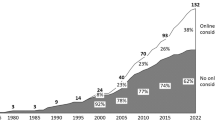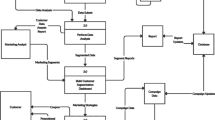Abstract
As a kind of the most significantly popular information in markets, the sales ranking has great impacts on consumer choice. However, there are few discussions on how sales ranking should be provided to consumers in the literature. This paper aims to answer the following two questions: 1) To what extent does the sales ranking influence consumer choices; 2) When the sales ranking should be provided to consumers. To do so, this paper first constructs a sales ranking model and then provides detailed simulation experiments to demonstrate the model. The experimental results show that for markets where consumer preferences are dramatically different, such as music and movie markets, sales rankings do not have significant influences on consumer choices and should not be provided to consumers until a large number of early independent consumer choices have been accumulated. But for markets in which consumer preferences are similar, such as markets for official supplies, sales rankings have more influences on consumer choices and should be provided to consumers earlier. Furthermore, an evolution strategy is proposed to ascertain the most suitable sales rankings (characterised by suitable influence strength and suitable release time) for some specified online markets. The comparison results show that the optimized sales rankings not only can help consumers discover higher-quality products but also can improve overall sales.
Similar content being viewed by others
References
Archak N, Ghose A, Ipeirotis P G (2011). Deriving the pricing power of product features by mining consumer reviews. Social Science Electronic Publishing 57(8): 1485–1509.
Anderson L R, Holt C A (1997). Information cascades in the laboratory. American Economic Review 87(5): 847–862.
Banerjee A V (1992). A simple model of herd behavior. Quarterly Journal of Economics 107(3): 797–817.
Bonabeau E (2002). Agent-based modelin.g: Methods and techniques for simulating human systems. Proceedings of the National Academy of Sciences of the United States of America 99: 7280–7287.
Bikhchandani S, Hirshleifer D, Welch I (1998). Learning from the behavior of others: Conformity, fads, and informational cascades. Journal of Economic Perspectives 12(3): 151–170.
Celen B, Kariv S (2004). Observational learning under imperfect information. Games and Economic Behavior 47(1): 72–86.
Cai H, Fang C H (2009). Observational learning: Evidence from a randomized natural field experiment. American Economic Review 99(3): 864–882.
Cai S, Xu Y C (2008). Designing product lists for Ecommerce: The effects of sorting on consumer decision, aking. International Journal of Human-Computer Interaction 24(7): 700–721.
Chevalier J, Mayzlin D (2006). The effect of word of mouth online: Online book reviews. Journal of Marketing Research 43(3): 345–354.
Chen K, Luo P, Wang H (2016). An influence framework on product word-of-mouth (WoM) measurement. Information & Management 54(2): 228–240.
Chen Y, Wang Q, Xie J (2011). Online social interactions: A natural experiment on word of mouth versus observational learning. Journal of Marketing Research 48(2): 238–254.
Cheung C M K, Thadani D R (2012). The impact of electronic word-of-mouth communication: A literature analysis and integrative model. Decision Support Systems 54: 461–470.
Cheung CMK, Xiao B S, Liu I L B (2014). Do actions speak louder than voices? The signaling role of social information cues in influencing consumer purchase decisions. Decision Support Systems 65(1): 50–58.
Denrell J, Liu C (2012). Top performers are not the most impressive when extreme performance indicates unreliability. Proceedings of the National Academy of Sciences of the United States of America 109(24): 9331–9336.
Dewan S, Ramaprasad J (2012). Music blogging, online Sampling, and the long tail. Information Systems Research 23: 1056–1067.
Fan Z P, Xi Y, Liu Y (2018). Supporting consumer’s purchase decision: A method for ranking products based on online multi-attribute product ratings. Soft Computing 22(16): 5247–5261.
Forman C, Ghose A, Wiesenfeld B (2008). Examining the relationship between reviews and sales: The role of reviewer identity disclosure in electronic markets. Information Systems Research 19(3): 291–313.
Galton F (1907). Vox populi. Nature 75: 450–451.
Godes D, Mayzlin D, Chen Y, Das S, Dellarocas C, Pfeiffer B, Libai B, Sen S, Shi M, Verlegh P (2005). The firm’s management of social interactions. Marketing Letters 16(3): 415–428.
Godes D, Silva J C (2012). Sequential and temporal dynamics of online opinion. Journal of Marketing Research 31(3): 448–473.
Guo C, Tang H (2001). Global convergence properties of evolution strategy. Chinese Journal Numerical Mathematics and Applications 23(2): 78–84.
Gu B, Tang Q, Whinston A B (2013). The influence of online word-of-mouth on long tail formation. Decision Support Systems 56: 474–481.
Hedstrom P (2006). Experimental macro sociology: Predicting the next best seller. Science 311(5762): 786–787.
Hu N, Koh N S, Reddy S K (2014). Ratings lead you to the product, reviews help you clinch it? The mediating role of online review sentiments on product sales. Decision Support Systems 57: 42–53.
Kee T (2008). Majority of online shoppers check at least four reviews before buying. Online Media Daily (February 19).
Krumme C, Cebrian M, Pickard G, Pentland S (2010). Quantifying social influence in an online cultural market. PLOS One 7(5): e33785.
Kuksov D, Wang K (2013). A model of the “IT” products in fashion. Journal of Marketing Science 32(1): 51–69.
Li X, Hitt L M (2008). Self-selection and information role of online product reviews. Information Systems Research 19(4): 456–474.
Lorenz J, Rauhut H, Schweitzer F, Helbing D (2011). How social influence can undermine the wisdom of crowd effect. Proceedings of the National Academy of Sciences of the United States of America 108(22): 9020–9025.
McGran K (2005). Internet hurting dealer profits; savvy shoppers hunt for bargains buyers often know more than sellers. Toronto Star (November 12): G4.
Rendell L, Boyd R, Cownden D, Enquist M, Eriksson K, Feldman MW, Fogarty L, Ghirlanda S, Lillicrap T, Laland KN (2010). Why copy others? Insights from the social learning strategies tournament. Science 328(5975): 208–213.
Salganik M J, Dodds P S, Watts D J (2006). Experimental study of inequality and unpredictability in an artificial cultural market. Science 311(5762): 854–856.
Salganik M J (2008). Data from success and failure in cultural markets. Available at http://wvww.princeton.edu/∼mjs3/data.shtml.
Sun M (2012). How does the variance of product ratings matter?. Management Science 58(4): 696–707.
Surowiecki J (2004). The Wisdom of crowds: Why the many are smarter than the few and how collective wisdom shapes business, economies. Societies, and Nation Doubleday Books.
Tarn K Y, Ho S Y (2005). Web personalization as a persuasion strategy: An elaboration likelihood model perspective. Information Systems Research 16(3): 271–291.
Tucker C, Zhang J J (2011). How does popularity information affect choices? A field experiment. Marketing Science 57(5): 828–842.
Turban E, Aronson J E (2000). Decision Support Systems and Intelligent Systems (6ed). Prentice Hall.
Ursu R M (2018). The power of rankings: Quantifying the effect of rankings on online consumer search and purchase decisions. Marketing Science 37(4): 530–552.
Woolley AW, Chabris CF, Pentland A, Hashmi N, Malone TW (2010). Evidence for a collective intelligence factor in the performance of human groups. Science 330(6004): 854–856.
Yang X, Yang G, Wu J (2016). Integrating rich and heterogeneous information to design a ranking system for multiple products. Decision Support Systems 84: 117–133.
Ye Q, Cheng Z, Fang B (2013). Learning from other buyers: The effect of purchase history records in online marketplaces. Decision Support Systems 56: 502–512.
Yoo B, Jeon S, Han T (2016). An analysis of popularity information effects: Field experiments in an online marketplace. Electronic Commerce Research and Applications 17: 87–98.
Zhang J J (2010). The sound of silence: Observational learning from the U.S. kidney market. Marketing Science 29(2): 315–335.
Acknowledgments
This work has been supported in part by the National Natural Science Foundation of China (Nos. 71771034, 71901011, 71971039), the Science of Technology Program of Jieyang(No.2017xm041), Funds for Creative Research Group of China (No. 71421001), and the Scientific and Technological Innovation Foundation of Dalian (No. 2018J11CY009).
Author information
Authors and Affiliations
Corresponding author
Additional information
Endnotes
1It can be supported by the studies of the wisdom of crowd effect. These researches can date back to 100 years ago (Galton 1907). The effect indicates that the median estimate of a group (where individuals make decisions independently) can be more accurate than the estimates of experts. This was recently supported by examples from stock markets, political elections, and quiz shows (Surowiecki 2004). The wisdom of groups effect has even been heralded as a harbinger of accelerated human potential (Woolley et al. 2010).
Lin Tang is currently pursuing her Ph.D. degree in management science and engineering at Dalian University of Technology. She was born in 1980. She received her B.S. degree in computer science and technology from Liaoning Technology University in 2003 and her M.S. degree in computer application from Dalian University of Technology in 2008. Her research interests include text data mining, machine learning, and deep learning.
Leilei Sun is an assistant professor of the State Key Laboratory of Software Development Environment and Big Data Brain Computing Lab (SKLSDE and BDBC Lab), Beihang University, Bejing, China. He was a postdoctoral research fellow from 2017 to 2019 in the School of Economics and Management, Tsinghua University. He received his B.S. degree in 2009 and M.S. degree, in 2012, from the School of Control Theory and Control Engineering, Dalian University of Technology. He received his Ph.D. degree from the Institute of Systems Engineering, Dalian University of Technology, in 2017. His research interests include machine learning and data mining. He has published several papers on IEEE Transactions on Data and Knowledge Engineering (TKDE), Knowledge and Information Systems (KAIS), and ACM SIGKDD International Conference on Knowledge Discovery and Data Mining (KDD).
Chonghui Guo is a professor of the Institute of Systems Engineering, Dalian University of Technology, Dalian, China. He received a B.S. degree in mathematics from Liaoning University in 1995, an M.S. degree in operational research and control theory in 1999, and a Ph.D. degree in management science and engineering from Dalian University of Technology in 2002. He was a postdoctoral research fellow in the Department of Computer Science at Tsinghua University, Beijing, China. His studies concentrate on data mining and knowledge discovery. He has published over 100 peer-reviewed papers in academic journals and conferences, besides 5 text-books and 2 monographs. He has been the principal investigator on over 10 research projects from the government and the industry.
Yuqian Zuo is currently pursuing her M.S. degree on management science and engineering from Dalian University of Technology. She was born in 1997. She received her B.S. in electronic commerce from Dalian University of Technology in 2019. Her research interests include data mining and data analysis.
Zhen Zhang is an associate professor with the Institute of Systems Engineering, Dalian University of Technology. He was born in 1986. He received his B.S. in engineering management from China University of Petroleum (Eastern China) and a Ph.D. degree in management science and engineering from the Dalian University of Technology in 2014. His current research interests include group decision making, computing with words, and big data analysis. He is an associate editor of Kybernetes and Journal of Intelligent & Fuzzy Systems and an editorial board member of International Journal of Computational Intelligence Systems.
Rights and permissions
About this article
Cite this article
Tang, L., Sun, L., Guo, C. et al. A Simulation Research Towards Better Leverage of Sales Ranking. J. Syst. Sci. Syst. Eng. 30, 105–122 (2021). https://doi.org/10.1007/s11518-021-5478-4
Published:
Issue Date:
DOI: https://doi.org/10.1007/s11518-021-5478-4




